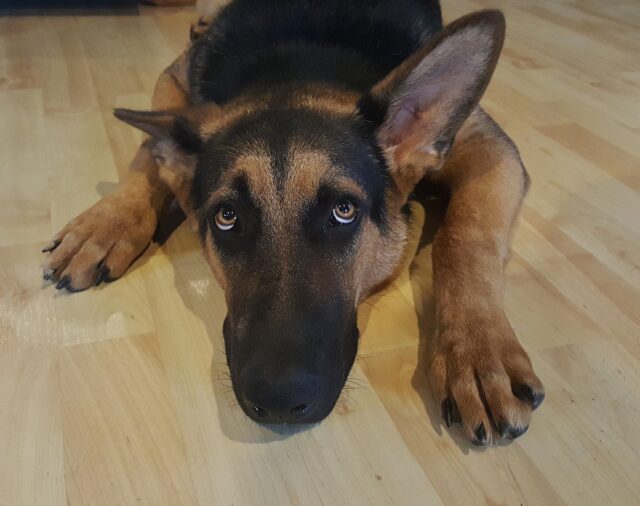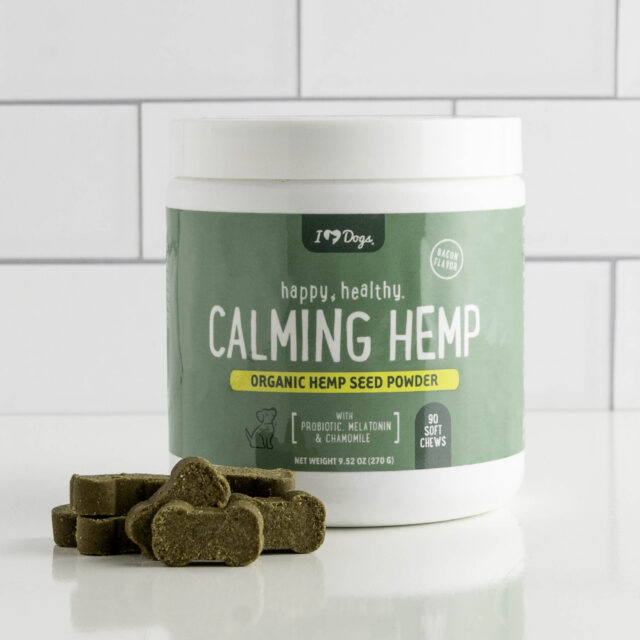
The world can be scary for an anxious dog. Thunderstorms, vet visits, and sudden changes are just a few things that could give your pup sudden anxiety. But your dog shouldn’t have to suffer when they’re feeling stressed or restless. That’s why many dog parents are turning to valerian root for dogs.
Valerian root provides natural anxiety relief to furry friends. Dogs who take supplements with anxiety-reducing ingredients may feel more content and peaceful as a result. So, how can valerian root make your dog’s life easier, and how does it work?

What is Valerian Root for Dogs?
Valeriana officinalis, more commonly known as valerian, is a flowering perennial herb native to Europe and Asia. However, it’s now grown in countries all over the world, especially in areas of North America. The plant’s root has been used as a sedative for many years due to its effects on the brain and nervous system. Small flowers bloom from the herb during the summer months, usually with white, purple, or pink hues.
The roots of this plant are very distinct. Many people find an earthy odor displeasing and much different from the aromatic flowers. Yet, people have learned to look past the pungent smell in order to reap the benefits of valerian root. Humans crush up the root to make it into a powder or tincture.
Hippocrates once wrote about valerian root, mentioning its therapeutic properties. At the time, it was sometimes given as a remedy for insomnia. The name “valerian” comes from the Latin word “valere,” which can mean “be well.” The name relates to the plant’s health benefits.
While the herb is commonly used for humans, it’s becoming more popular in the canine world too. Valerian root’s sedative qualities are thought to reduce anxiety in dogs. It may also be effective for other pets, such as cats and rabbits.

How Does it Work?
No one knows precisely how valerian root provides relief for dogs. Scientists suspect that it increases gamma-aminobutyric acid (GABA) in the brain. That GABA can get in between the nerve transitions of neurons, which makes dogs feel calmer. Yet, there haven’t been enough studies on how it affects dogs to support that claim.
Low amounts of GABA can lead to increased anxiety and less sleep. So, increasing those substances in the brain can help your dog feel calm naturally. A proper amount of GABA in your dog’s brain can lower all types of stress, including psychological and physical.
While many dogs have experienced reduced stress after taking valerian root, it’s rare for vets to recommend it due to the minimal research about the ingredient. Some studies have been done, but not enough to confirm its effects.
Is Valerian Root Safe For Dogs?
Yes, valerian root is safe for dogs. Despite a lack of research about it, many vets agree that it has some anti-anxiety properties. Yet, it’s not safe for puppies, pregnant dogs, or dogs with underlying health conditions, so make sure none of those apply to your dog before serving it.
As always, the safety of a drug or supplement varies for every dog. So, talk to your vet about supplements with valerian root before giving one to your dog.
What Does Valerian Root Do for Dogs?
Valerian root has sedative, hypnotic, and relaxing properties to help dogs feel relaxed. The most common use of valerian root for dogs is calming your canine’s stress. It’s used to combat common fears in dogs, such as loud noises, separation anxiety, and unfamiliar situations. The sedative properties of the herb can also improve your dog’s sleep.
Any dogs feeling anxious, nervous, stressed, or irritable could benefit from taking valerian root. This ingredient can be given regularly or shortly before a stressful situation.
In rare cases, valerian root may be used to treat hyperactivity because of its antispasmodic or anticonvulsant properties. It may be able to reduce the risk of seizures too. Yet, if your dog has seizures frequently, you should talk to your vet to find a more effective solution. They may suggest valerian root or recommend something else.

What Causes Anxiety in Dogs?
Relieving your dog’s anxiety is easiest if you know the issue causing it. If possible, figure out what’s bothering your dog and remove the trigger. If you’re unable to get rid of what’s stressing your dog out, that’s when you may need to turn to a supplement for help.
Some signs of stress include panting, licking lips, trembling, pacing, and whining. Taking note of when your dog displays these behaviors can help you understand what makes them anxious.
Loud Noises
Overwhelming noises like thunderstorms and fireworks might send an anxious pup hiding under the bed. If you know there might be loud sounds happening soon, you can give your pup a valerian root supplement beforehand to lessen their fears. Keeping them further away from the sounds, such as in a basement or sound-proof room, may also make the noises seem less scary.
Separation Anxiety
Separation anxiety is very common in dogs, especially with more humans working from home. Your dog may become fearful or destructive when you leave the house, but that doesn’t mean you need to spend every second with your dog. Anxiety supplements can make alone time less scary for your pup. Finding the cause of these fears could also help you calm them down.
Travel
Some dogs don’t handle any type of travel well, even short car rides. If you’re about to take your dog on a road trip, a supplement might be the key to preventing their anxious behaviors like whining and pacing. Before any long trip, it’s a good idea to talk to your vet about ways to relax your pup.

Certain Situations
Vet visits and grooming appointments are two common stressors for dogs. Sometimes, dogs are also afraid of new or unfamiliar situations, such as staying at a friend’s house or moving to a new home. If you know an upcoming situation may worry your dog, a supplement could help.
In some cases, you may not know why your dog is anxious, which can make it harder to calm them. Yet, consistently giving them an anxiety-relief supplement could be good for them.
How Much Valerian Root for Dogs is Ideal?
It’s difficult to determine a valerian root dosage for dogs because the amount varies greatly based on their weight and anxiety levels. You may be able to estimate a dosage for your dog, but it’s best to get a professional’s suggestion first. Talk to your vet about what they think is the ideal dosage for your dog.
Valerian Root Dosage for Dogs
You would rarely give your dog valerian root on its own. In most cases, it’ll be an ingredient in a supplement, so you can refer to the packaging for the dosage based on weight. Most supplements will require you to give your dog one or two chews per dose. However, some supplements are liquid or powder, which can make the dosage vary greatly.
If you give your dog dried valerian root on its own, you’ll likely need to give them between 1/4 and 1 1/2 teaspoons per dose. If the valerian root is a tincture, give them 1 1/2 to 3 teaspoons.
For liquid supplements, you can give 10 drops to small dogs, 15-20 drops to small-medium dogs, 30-40 drops to medium dogs, and 60 drops to large dogs. The exact doses depend on the product you choose.

Again, these doses are only suggestions. If you want to reduce the risk of side effects, you should confirm the ideal dosage with your vet before serving it. When choosing a supplement, look for ones made specifically for dogs rather than using human options.
If your dog has trouble sleeping, you should give them a dose of valerian root in the afternoon and then another before bed. If you only give them one at night, that could worsen their insomnia. However, if you’re only using the supplement for general anxiety, the time of day you give it to your dog isn’t as important.
Side Effects of Valerian Root for Dogs
Even natural remedies can have risks. For the most part, valerian root is a safe ingredient with a low chance of causing side effects. However, it’s possible for dogs to experience some unusual behaviors after taking it.
Here are some potential side effects of valerian root for dogs:
- Drowsiness
- Lethargy
- Low Body Temperature
- Dizziness
- Nausea
- Unsteadiness
In rare cases, valerian root could do the opposite of what it’s supposed to by causing hyperactivity. However, that’s usually only associated with a dose that’s too high. Following the dose suggestion of a vet is the best way to reduce the risk of any side effects.
When your pet first takes a supplement with valerian root in it, monitor their behaviors closely. If you notice anything unusual or concerning, stop giving them the ingredient right away and reach out to your vet. While it’s a safer alternative to other drugs, it can still cause problems for some dogs.
Are There Any Drug Interactions?
Before starting your dog on any new medication or supplement, talk to your vet about the other medications your dog is taking. Valerian root can interact with some other drugs, worsening side effects. If your dog is taking an anti-fungal drug, valerian root may not be safe for them.
Also, valerian root may interact with anti-epileptic medications or antihistamines. Any drug that affects your dog’s mood could be unsafe if used with this ingredient. Valerian root may also affect the anesthetics before surgery. So, if your dog is about to undergo surgery, stop giving them valerian root supplements.

How to Serve Valerian Root to Your Dog
Valerian root comes in many forms for dogs. Some pet parents simply serve dried versions of the ingredient, while others choose tinctures, which are the liquid extracts of the plant. These options are both pure valerian root, so your dog can reap the benefits without you having to worry about the effects of other ingredients.
If you prefer a supplement that includes valerian root, you can choose from capsules, powder, or chewable options. All variations can be effective, but chews are the most common choice for picky eaters. Dogs will think they’re treats without realizing that they’re healthy. With any other form, you may have to find ways to disguise the supplement using other food.
A less common version of valerian root is essential oils. You can administer the oils by applying them on your dog’s back, similar to a flea preventative. It’s unclear if this method is as effective as edible options, but it’s another alternative for dogs who don’t like to eat pills and supplements.
When in doubt, ask your vet which form of valerian root will be most effective for your dog. The answer may vary based on your dog’s age, weight, and medical history.
A Tasty Treat!
When choosing the best supplement for your dog, it’s essential to get the product from a company you trust. Before purchasing one, look at the ingredient list closely to ensure that all the ingredients are items you feel safe giving your dog.
If you have a picky pup, the iHeartDogs 9-in-1 Calming Chews is an anxiety-reducing supplement in the form of a tasty treat. It’s designed to ease your dog’s anxiety while also promoting healthy sleep and benefitting digestion.
In addition to valerian root, this supplement also includes organic hemp powder, chamomile, melatonin, and L tryptophan. All of these items can help your dog relax and feel less anxious. Plus, every container purchased donates 14 healthy meals to shelter dogs. So, these chews will help your own dog’s health while also benefitting dogs in need.
Anxiety can get in the way of a happy, healthy life, so it’s important for you to manage your dog’s stress if possible. Valerian root is an ingredient that can help your dog feel calm and relaxed, so consider using it as a life-changing supplement.
The post Valerian Root for Dogs: Discover Its Anti-Anxiety Benefits appeared first on iHeartDogs.com.
from iHeartDogs.com https://ift.tt/eLdf0ci https://ift.tt/vVrLEfC


No comments:
Post a Comment